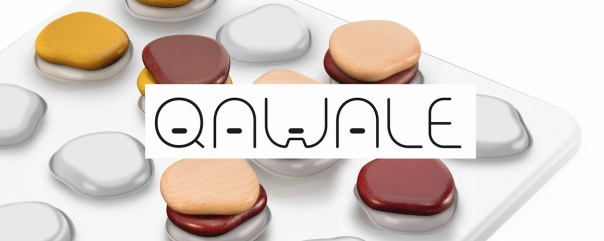Goofy Little Hamburgers
I’m suspicious of anything marketed as a “coffee table game.” For one thing, I belong to the generation that according to newspaper op-eds has ruined everything good in western society, coffee tables included. For another, why should I take a chance on an unknown title for ornamenting my home when I could just put out a nice chess set, go board, or most handsome of all, a crokinole round? Less talking, more flicking.
Qawale, designed by Romain Froger and Didier Lenain-Bragard, was explicitly pitched to me as a coffee table game. To my uncultured eye, it bears closer resemblance to a bunch of goofy little hamburgers on a griddle.
See? Do you see? Patty, bun, mustard. Those are hamburgers.
In addition to being a deeply thematic game about not understanding how to properly assemble a hamburger, Qawale is also a mildly brilliant abstract game. Like many mildly brilliant abstract games, it’s based on the idea that you need to connect four “stones,” as they’re called in the rulebook, although they’re not stones at all but painted wood, in a row. Horizontally, vertically, diagonally. It doesn’t matter. Arrange four of them in a row and you win.
Of course, there’s a catch. These stones stack. And your stones need to be on top of their stack to count. When the game opens, there are only neutral mustard stones on the board. Playing as either patties or buns, you’ll have to both spread your pieces across the board and ensure they’re on top of their stacks in order to win.
Here’s where Qawale becomes mildly brilliant. Rather than merely placing a stone on the board like some sort of basic player of abstract games, you place and then move them. As in, you set your stone atop a stack and then move the entire thing, mancala-style, around the board, dropping off stones along the way.
There are a few particulars. You can revisit a space, but not by stepping directly backwards. Dropping off two stones in a single space therefore requires a fairly tall stack and a roundabout square maneuver. Also, the order of a stack needs to be respected. You know how in Star Trek everybody plays three-dimensional chess? Qawale is a little bit like that, in that you’re always looking at the composition of those stacks and how they can be deposited.
And yes, it really is mildly brilliant. Like another abstract game we recently examined, Orion Duel, the real meat of these hamburgers is a ground beef of disruption and opportunity. Arranging four stones in a row isn’t particularly difficult, so it behooves players to constantly assault their opponent’s placements. But rearranging stones tends to seed new openings across the board. Within a few initial maneuvers, every move becomes a nervous bundle, both defense and offense and threat at the same time.
It isn’t uncommon, for instance, for any given move to be just one placement short of victory. So your opponent goes and disrupts the board, putting them one stone shy of winning. So you go, messing with the board state all over again. And so forth. With each move, the board becomes more crowded, the towers a little taller, the mancalas more efficacious. Qawale seems like the sort of game where stalemates would be common, but these escalations nudge the players inexorably toward a final masterstroke.
Which isn’t to say the whole thing demands much attention. This beef is extra lean, five to ten minutes tops, too brief and too skinny to generate much drama. Before long, certain moves out themselves as favorable, especially if you can stack two or three of your own stones atop one another. In theory, these could produce a metagame of sorts. Stacks of opposing stones should be broken up as soon as possible. The game’s brisk nature belies such a possibility. The mancala movements are the best part, such an obvious and appealing concept that it’s baffling it hasn’t been done before. But Qawale can’t escape the niggling sensation that it’s a proof of concept, a mini version of a fuller experience.
Or maybe this millennial is ruining abstract games. Again.
Here’s the protein: Qawale is smart, but that doesn’t bestow lasting appeal. It isn’t the sort of thing I would display on my nonexistent coffee table, nor is it something I intend to revisit. But its central concept deserves emulation and exploration. May we see more mancala derivatives in the years to come. Even if they’re painted to look like incompetent hamburgers.
(If what I’m doing at Space-Biff! is valuable to you in some way, please consider dropping by my Patreon campaign or Ko-fi.)
A complimentary copy was provided.
Posted on April 10, 2024, in Board Game. Bookmark the permalink. 4 Comments.




Man, this review really cracked me up. Great one!
Makes me think of the way Tak works…
I really need to try Tak sometime.
“Even if they’re painted to look like incompetent hamburgers.” Haha
Freakin’ millennials.